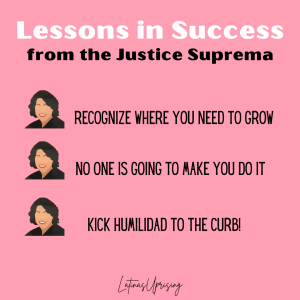Lessons in Success: learning from Justice Sotomayor
Recently, Justice Sotomayor made the news because of a study that showed how the women justices were interrupted more frequently by their male counterparts. I really liked this story because not only did Sotomayor bring it to the attention of Chief Justice Roberts, but Roberts actually changed their process to help address this behavior. I mean I’ll take any victory big and small to celebrate. Good for any change that strikes back at the weird toxicity of this profession.

But the rule has just change. What did Sotomayor do before? Did she just let her male colleagues take her time? Not let her make her point? As if.
”I interrupt back.”
And just like that, she highlights how important it is to understand the norms of your particular work setting and implement those norms in your work. Interrupting colleagues may not work in every space, but there may be other situations where your voice or ability to participate is impeded and you have to know the right tools to use to help your case.
As I read this story I thought of the other lessons I’ve picked up from here that I frequently use as a guide and want to share them with you:
One. Recognize Opportunities for Improvement. Early into her first year at Princeton she recognized her limited awareness and knowledge in things she’s “supposed” to know, but wasn’t exposed to growing up—things like reading the classics. However, coming to terms with that allows her to push herself to seek out that information so she’s better equipped with knowledge that can help her in her current setting. How about that? There will always be ways in which we feel we fall short in our knowledge or skills—especially as we enter a profession that purposefully excludes us. But the answer isn’t to just shrug & forget it, but to consider if there are ways to seek out that information to increase your own knowledge.
Two. No One is Going to Make You Do It. This is a lesson from her early childhood where she realizes she has to learn how to give herself insulin if she wants to continue to visit her grandmother. And she does. She learns the process as a little girl and learns to give herself injections. That type of tenacity stays with you and it’s no wonder she could push herself to do other difficult things. And we have to find that same strength in ourself to push ourselves to do things we don’t always want to do, or enjoy, if we want to reach our goals. Keeping a strict schedule to study for finals, saving money for a bar prep course, or even pushing ourselves to try complex cases to develop our skills—all of that can feel uncomfortable and you can’t depend on others to push you to do what’s right for yourself. You have to learn to do it.
Three. Kick Humilidad to the Curb. This is by far my favorite lesson and I share often with others. She calls out the importance of others knowing about your accomplishments. And self promotion is difficult, not just because of our own feelings of sharing what we’ve done but there can also be real backlash by people who think you’re too confident or too whatever. But she is correct, you would rather people think you’re full of yourself even though you have a track record of success than have that record but no one even knows about it. Take the time to take stock of your accomplishments, of your strengths, and don’t be shy in ensuring you’re given credit when it’s due. The more comfortable you are in your abilities the easier it will be for you to seek and gain new opportunities.
Whew, these are big lessons! Putting them into practicing doesn’t happen overnight but incorporating them, even little by little, will strengthen your awareness of self and help you better achieve your goals. If you’ve read My Beloved World or been inspired in other ways by Justice Sotomayor, what other lessons from her would you share?
